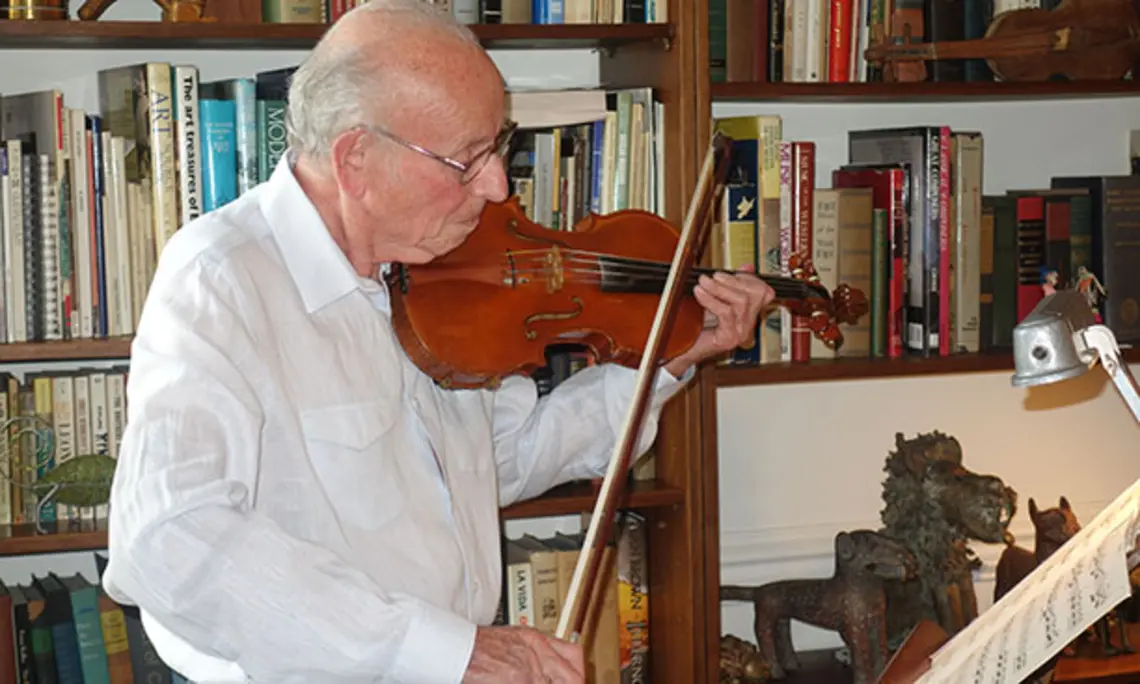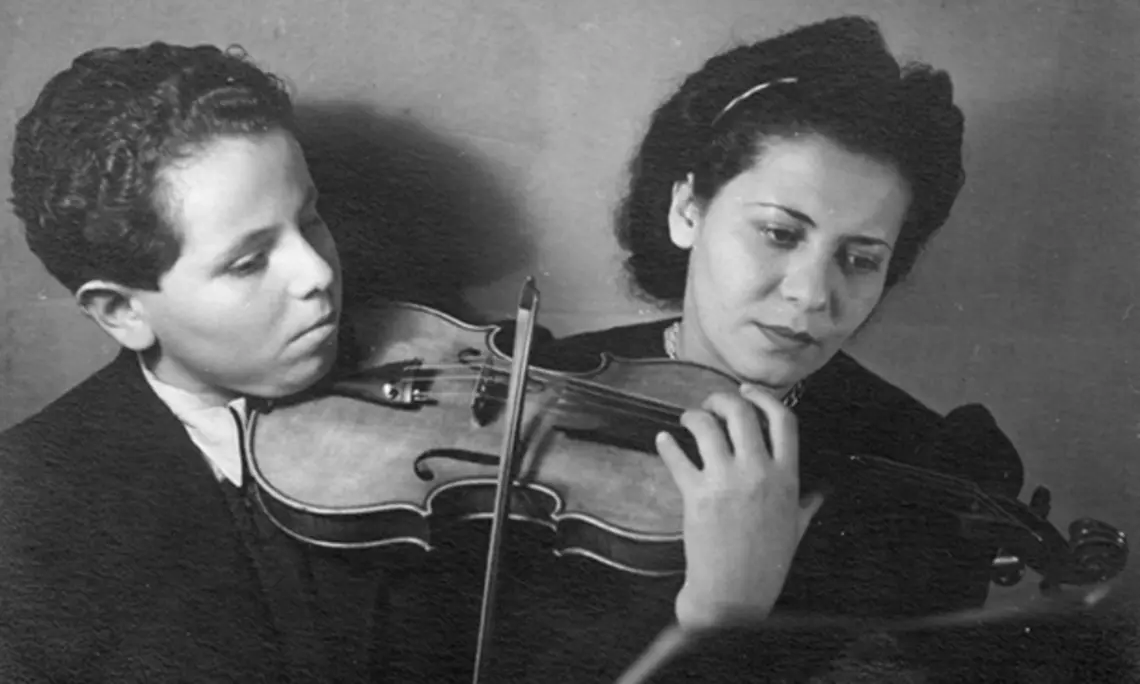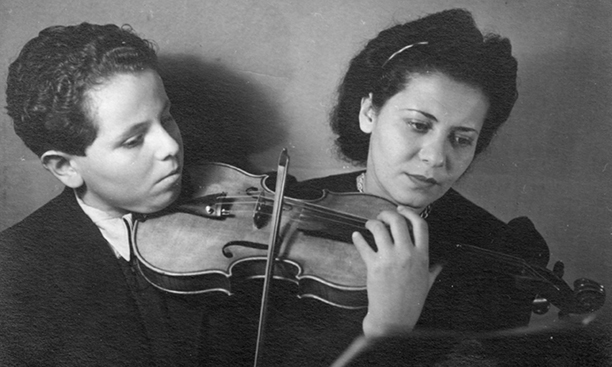

When Jerry Sorell ’50 *51 and his family fled Austria in 1938, he left behind his hopes of becoming a professional musician. “I decided that chemical engineering would be a way to earn a living,” Sorell says, “and music would be something I really enjoyed.” Nearly eight decades later, his love of violin lives on.
PAW Tracks is also available on iTunes — click here to subscribe
TRANSCRIPT
Jeanette Beebe ’14: I’m Jeanette Beebe, Class of 2014. For this episode of PAW Tracks, we spoke with Jerry Sorell, Class of 1950, who has been passionate about music for most of his life.
Now 90, he is both an accomplished violinist and a retired chemical engineer. He lives in North Caldwell, N.J., with his wife, Susie, of nearly 65 years.
In April, he celebrated his birthday with a concert he called “Still Fiddling at 90.” In a full room of family members and friends, he performed a set of classical pieces and folk tunes. His daughter, Dr. Tamara Sorell, Class of ’81, joined him on piano.
Here’s Sorell playing the theme from Schindler’s List, dedicated to the memory of his grandmothers, who each died at Auschwitz.
Sorell was the concert master of the Princeton University Orchestra. But over time, he’s realized he prefers to make music in smaller rooms. He says the performance is more intimate that way.
Jerry Sorell ’50 *51: You are in charge of shaping the music, the expressions, you know: where are the softs and the louds, the tempo, speeding up, slowing down. Whereas if you play in an orchestra, the conductor is the field marshal. I mean he’s — he’s a real dictator. You’ve got to follow exactly his tempo. And you often see him: soft, soft, you know, or he often goes like that: let’s speed it up. And so in chamber music, it’s the musicians themselves. Usually the first violin, again, is the leader, but by and large, it’s a community affair. Everybody listens to each other, and if the cellist has some good ideas, obviously we incorporate them. It’s not a dictatorship. It’s a much more demanding and intimate way of making music than to play just in a large ensemble, you know.
JB: Jerry, or Gerhard, picked up the violin at age 9. He was inspired by his father, who played the instrument nearly non-stop. In Vienna, where Jerry was born and grew up, music was as essential as air. It was part of his home, his family, his culture.
JS: My birth father, the one who taught me violin, died when I was about 10 or 11 years old of TB, which was a deadly disease at that time. And my mother sort of had to support me, and her parents. And so it was a very stressful time. I wouldn’t say that I had a terrible childhood, but it was a little bit stressful. As I said, I hardly met my father after he had the TB, because at that time, it was warned, because of its contagion. So he was in sanitarias, and stuff like that, you know. And my mother really had to work very hard from the day she was 14 years old to support her whole family. So it was a little bit stressful; it was not a comfortable thing, you know. But on the other hand, there was always love in the family, which was more important than material goods and money, you know.
JB: Still, after his father passed away from TB, little Gerhard persevered. He kept up his love for music. He kept practicing. Eventually, he was accepted into the Vienna Conservatory — a prestigious institution to study music, especially as a child.
He lived in Vienna until age 12. Then, in 1938, Germany invaded, and his family was forced to flee the country to Luxembourg.
JS: I started out to be a professional musician in Vienna back in the ’30s. But when Hitler came, us being Jewish, we fled. And literally we were on our way to the United States, but we couldn’t get the Visa, or the Affidavit, as they called it at the time. And so I sort of lost the momentum to continue as a professional musician.
JB: His family moved to London first. Then, they made the trip across the Atlantic. They landed in New York City on Thanksgiving Day, 1939.
JS: And I made the decision, really after we finally got to the United States, that I’ll keep music as an avocation. And chose — I’ve always liked chemistry and math, and all that, so I decided that chemical engineering would be a way to earn a living, and music would be something I really enjoyed and kept up with.
JB: He continued to practice violin in New York. As a teenager, he was interviewed in The New York Times about one of his original compositions. Then, at 19, he was drafted to serve in World War II.
JS: I spent close to two years in the Army in the U.S. Infantry. Believe it or not, I was in a machine gun and mortar outfit: heavy weapons. I had told him, I speak perfect German — couldn’t you use me, use those skills? No, no no. Off I went to basic training. But after, after the war stopped, after V-E Day, they finally realized I had something to offer with my fluency in German. They assigned me to the counter-intelligence core, which was sort of similar to a CIA that the Army ran. And to interrogate German Prisoners of War and also some Nazi officials. And so that was a great deal of satisfaction to be able to do that.
JB: When he was serving overseas, Jerry wrote letter after letter after letter back home. Over 400 arrived in his family’s mailbox in New York. And they saved every one.
JS: I was sort of apprehensive, as I wrote to my parents — they saved all my letters, and I happened to reread one of them — and in fact, it’s very similar to what’s happening now, to some extent. How I’m, after all of this experience, being in the infantry, with machine guns — getting almost shell-shocked, to some extent — how I’m going to catch up to the people who didn’t have to do it, how I’m going to fit in, you know. But uh, fortunately, it didn’t prove to be all that difficult. As I said, my concern was larger than the reality. I managed OK.
JB: Once he returned to the States after the war, he enrolled at Princeton. He majored in chemical engineering. He remembers his time on campus very well — he forged his own path.
JS: Quite honestly, I didn’t have much money — in fact, I didn’t have any money, really, so joining clubs really had no interest. Besides, my fiancé (whom you met) lived in New York, so I spent most of the weekends going back. So I really wasn’t tied in with the normal college experience, you know. Of course, I did go to lectures, and had fun, and all that, and there were parties and so on. But by and large, that was secondary, you know.
JB: He graduated Phi Betta Kappa from Princeton, and also earned a master’s degree in 1951. Then, he took a job as a materials engineer.
He worked at Kellogg, and then, at Esso Research and Engineering — which later became Exxon. At Esso, he led a team developing new, synthetic fuels.
JS: Especially when it came to synthetic fuels, it was all developing new technology. So there’s definitely some creative element, although it’s different, of course, than something in the arts. But it’s not — it’s not drudgework and calculations and stuff like that. It’s a lot of creative input.
There’s a dichotomy: usually, people in the arts, and some of the cultural aspects, somehow look down on number crunchers — the engineers, the technicians, and all that. That’s been worldwide, and it’s been forever and ever, you know. But that’s the way it is. Some of them feel a little bit more exalted than engineers and chemists.
Perhaps I’m overstating this thing, but there is a slight tension between the arts and the sciences. It’s true. And I think there’s — obviously, there’s room for both.
JB: His responsibilities grew. In 1980, he contributed to the National Materials Advisory Board’s official report for the world’s estimated international “energy needs.”
Looking back, he says he remembers loving Princeton because he could be both a scientist and a musician.
JS: It’s interesting how many scientists are also interested in music. Perfect example: Einstein! He loved the violin – he was a miserable violinist, so I’m told. But he liked to play quartets.
JB: Incredibly, as an undergraduate, he met Einstein — briefly.
More than 65 years after graduation, Sorell fondly remembers his college years.
JS: Even though I was rather pressed, and all that, and it was tough, I very much enjoyed Princeton. I still have connections with it. My daughter [Deborah Stehr ’84] is actually president of Alumni Association in some of the counties where we live. And we have these picnics, and holiday get-togethers, and all that. And I’m always there, the éminence grise, the old guy, Hey! You’re still walking upright.
And actually, one of my best friends, after all of these years – he was my roommate in Princeton who I was with, [Philip Atchison ’51].
The connection is still there, definitely. Princeton wasn’t just a trade school for me. It was a far broader experience. It’s a terrific place, that’s for sure.
Our thanks to Jerry Sorell for sharing his story. Jeanette Beebe produced this episode. The music is courtesy of Jerry Sorell.
Paw in print

February 2026
Lives Lived & Lost in 2025, Saying ’yes’ to more housing; AI startup stars



No responses yet